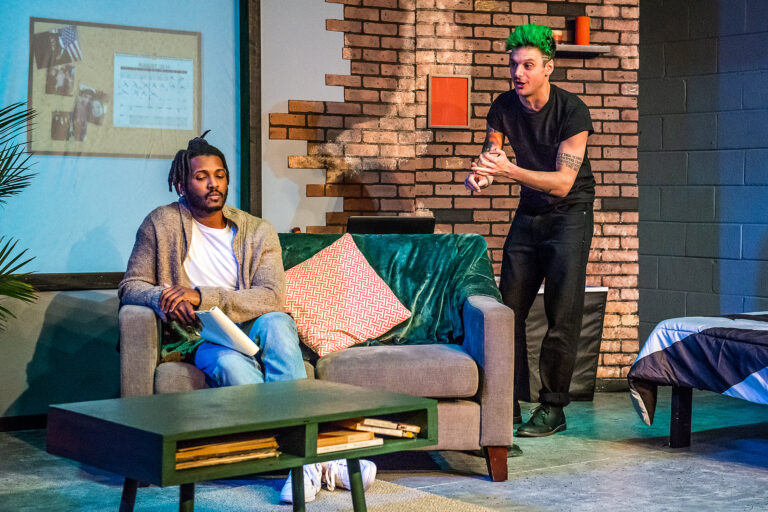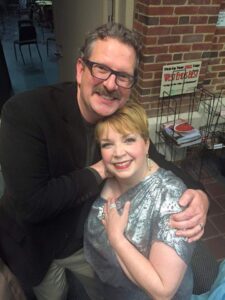In February, I saw Richmond Triangle Players’ production of Harrison David Rivers’ This Bitter Earth. It is a play centered around the relationship between Jesse, a black grad student and Neil, his white activist boyfriend. Through these characters, Rivers creates a dialogue between the audience and the production itself about race and activism. Jesse is apathetic and pessimistic, holding negative views of activists and activism that are not easily gleaned from the production. Neil, the trust fund activist, holds contempt and anger at Jesse’s apathy that I would have checked him on several times, were I in Jesse’s place. Neil seems to think that because Jesse is black he should be expressing rage with every shooting and every death. But that’s exhausting. Not everyone is built to be an activist. Sometimes just living one’s own black life is an act of resistance. The play was a sensitive work that had me thinking — Can one be fully pro-black centering white people in their life?
The play starts off with a monologue, then leans into a scene between two young men who you come to realize are the only characters in the play. Everything is centered around them. Scenes repeat throughout the play, slowly revealing the story’s timeline, which runs from the first time Jesse sees Neil at a Black Lives Matter protest to the moment Neil dies in Jesse’s arms.
Time passes rapidly throughout the play due to the format. The scenes aren’t sequenced in the order of time as we would generally perceive it – I realized that much of the play was Jesse’s memory. And as it goes with memory, the scenes come up in relation to inner thoughts. And that’s not jarring. Jesse’s monologues, sprinkled throughout the play, serve as an anchor for the timeline. Jesse speaks poignantly about gravity and his childhood and each scene that follows is thematically related to one of the major points of the monologue. These monologues that exist in an order that isn’t necessarily chronological but rather emotional, connected to Jesse’s memories.
The stage direction was dynamic. Director Brandon Rashad Butts had actors Andrew Rou Reid (Jesse) and Evan Nasteff (Neil) utilize the entirety of the space, moving from the couch to the bed, from the bed to the coffee table, and with each movement, a shift in time and space in the narrative. During one scene I could tell that they were on a metro simply because of the way their bodies moved and their dialogue. I thought the actors did a really nice job of showcasing the two character’s intimacy through non-sexual touch.
Lucian Restivo’s set design was cleverly done. The space on the stage melded from a coffee shop to a one-bedroom or studio apartment with a couch, a desk, and a bed – all of which the actors took full advantage of. The set’s windows doubled as screens showing Restivo’s projections of graffiti for #BlackLivesMatter changing as the timeline changed to reflect the black life that was taken relevant to the time of the scene.
Austin Harber’s lighting design amplifies the play’s themes with bisexual lighting (purple, pink, blue) for much of the dialogue. The way that spotlights were utilized was interesting – illuminating a singular character gently during the monologue, illuminating the bed and going dark during implied intimacy. This gave the illusion of privacy to the monologues and intimate moments and related to the audience the smallness of the world during those moments.
Skylar Glaser’s costume design worked well with the dialogue. Neil looked like a punk in his thirties in all black with a Vietnam War-era military hat he donned before heading out to travel to protests while Jesse looked like an English major – dressed comfortably in a cardigan and a simple white tee shirt, jeans, and sneakers.
The play is dotted with themes surrounding Essex Hemphill, a prominent gay poet/activist who died of AIDS complications in the mid-90s, a writer who Jesse seems to fixate on and whose activist work for the black community and especially for black women seems at odds with Jesse’s professed disdain for activism. At one point (and this is clearly very intentional), Jesse is describing a dream in which Essex Hemphill leans over, thinking he was going to kiss him, and instead telling Jesse “nice costume.” This could be the persona of apathy he puts on or pointing to the clothing he wore as an indicator of a mindset gearing toward quiet life. Either way, it seems to point to the heart of Jesse’s internal struggle: is he denying or betraying a part of himself by remaining passive and loving a white man?
I was supposed to see this production in-person, but the snow-storm happened and the Richmond Triangle Players were kind enough to switch my tickets to the on-demand option. I watched it from the comfort of my own home. The video player captured the sound well. It was at points exceedingly loud, but I much prefer that to not being able to hear it, especially as the volume on my computer could easily be turned down.
Richmond Triangle Players’ This Bitter Earth handled many difficult subjects deftly, and I think the conflict between Neil and Jesse over Jesse’s Black apathy and pessimism – especially Neil’s undue white outrage toward Jesse’s apathy – was expressed well. I questioned Jesse’s choices throughout the play, though from a different standpoint than Neil. The play doesn’t answer all of the questions it raises but leaves it to each viewer to ruminate on these themes and decide for themselves.



